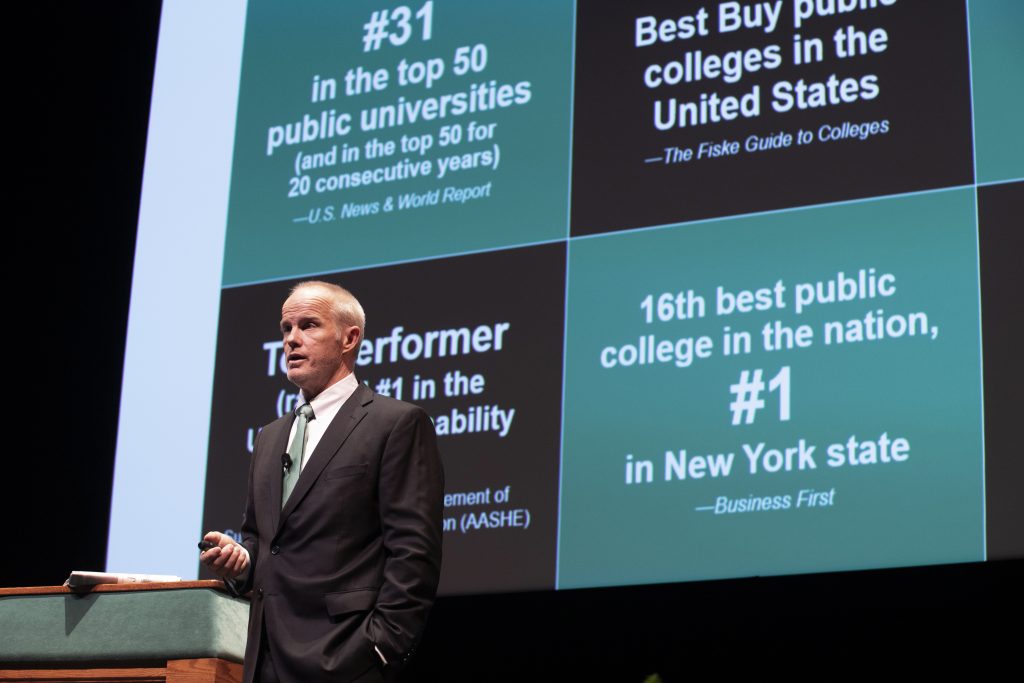Binghamton University President Harvey Stenger delivered his annual State of the University Address on Thursday, where he emphasized the year’s progress as well as one major “bump in the road.”
Stenger highlighted BU’s move to No. 31 of all U.S. public universities in the U.S. News & World Report college rankings. BU also became the top U.S. university performer in sustainability research and the School of Management was recently ranked as the seventh-best business school in the country with the least debt for master’s students.
But while the University continued to rise in rankings, 2019 marked a year with financial difficulty. BU originally missed its enrollment revenue targets, spent $8 million of its reserves and delayed University initiatives. After a full year of reorganizing, Stenger said progress has been made in tackling BU’s fiscal challenges.
“We are in much better shape now,” Stenger said. “We are not out of the woods, but we are in much better shape now. I thought the best way to go just two weeks ago was to lift the hiring hold, stop the review process and let the deans and the vice presidents manage the budget like they did in the past, while understanding that this could happen again very quickly.”
Stenger also noted accomplishments such as the launch of the University’s Human Rights Institute, the University earning a Carnegie Classification of “Very High Research” and M. Stanley Whittingham, a distinguished professor of chemistry and materials science and engineering, winning a Nobel Prize in Chemistry last week.
Stenger said he still envisions a bigger future for the University. The University is continuing to develop the Ford Family Wellness Center in Johnson City at the Health Sciences Campus for clinical experience, which Stenger said will create additional campus space for nursing students in social work, pharmacy and public health.
“We are almost doubling the amount of space dedicated to nursing in the college,” Stenger said. “It’s six stories and 90,000 square feet of the original building, but we’re going to add about 40,000 additional square feet for classrooms, dining and lounge space.”
By restructuring and rebranding the Decker School of Nursing as the Decker College of Nursing and Health Sciences, the University will launch a new School of Applied Health Sciences and School of Rehabilitation Sciences, creating new graduate programs to help BU hit its graduate student enrollment targets. Although the graduate numbers are expected to play a major role in the University’s financial stability going forward, Stenger said he will aim to keep BU’s undergraduate enrollment stationary.
“There are 14,000 undergraduates,” Stenger said.” “That’s the goal — that’s where we want to stay — that’s really the capacity for these students. The programs we are going to talk about for occupational therapy, physical therapy and speech [and] language pathology will be graduate programs for doctorates and master’s. We’re going to keep the undergraduate residential program the same size.”
One of the University’s main goals, according to Stenger, is to modernize Johnson City for college students by not only constructing campus space, but also implementing major private investment in housing projects and creating space for industry partnerships and startups.
Luz Velazquez, a junior majoring in psychology, said she is excited about the nursing program growing, but remains concerned about other campus resources.
“This is fantastic to hear, because many Binghamton [University] students want to pursue these medical tracks, and it would be great for them to have these opportunities,” Velazquez said. “I believe Binghamton needs to work on further expanding and developing their mental health services. I believe Binghamton should work toward providing students with more access to counseling services whether that involves hiring more counselors or readjusting their model.”
BU has started to launch several construction projects for the Glenn G. Bartle Library and the University Union to accommodate students on campus. Stenger said he has plans for the future to help stimulate more graduate enrollment and develop a greater campus for students to appreciate, including a gifts campaign, an innovation lab and a new welcome center.
These construction projects and renovations have been made possible, according to Stenger, through grants from the SUNY system and the state government, as well as philanthropic gestures from alumni. In the past two years, the University has received 13 individual $1 million or greater donations. Before 2017, the University had received just two in its entire history.



